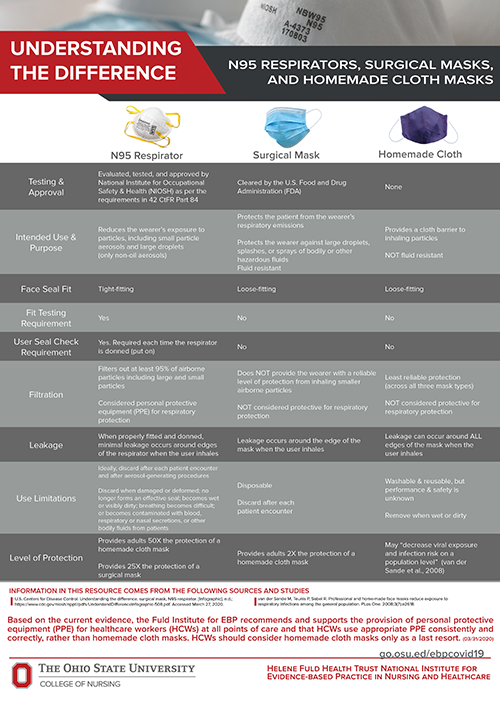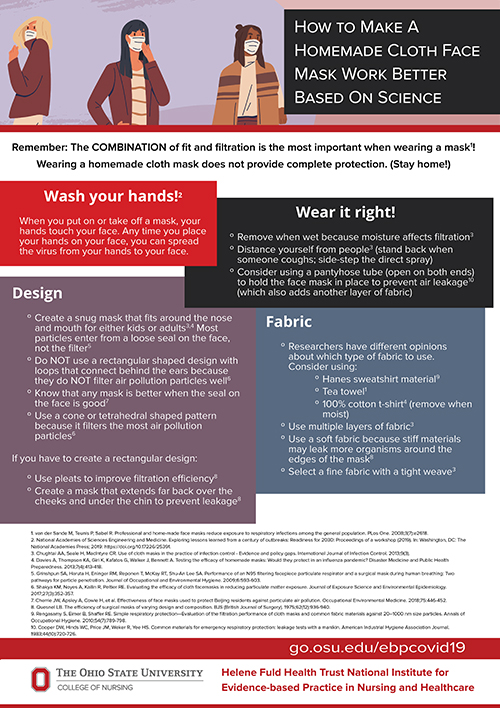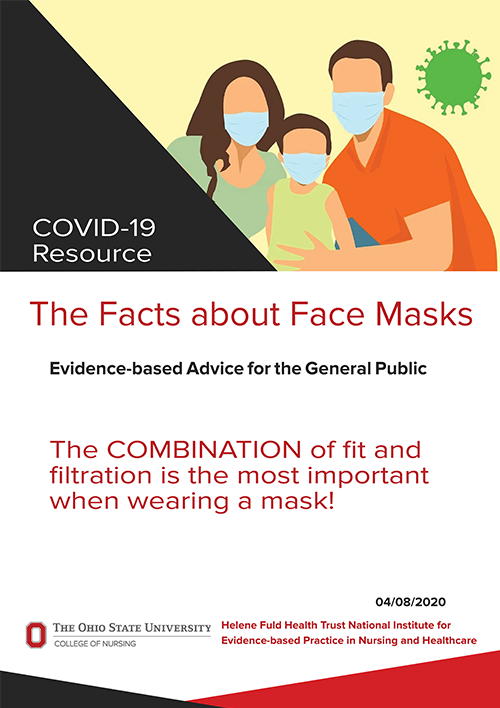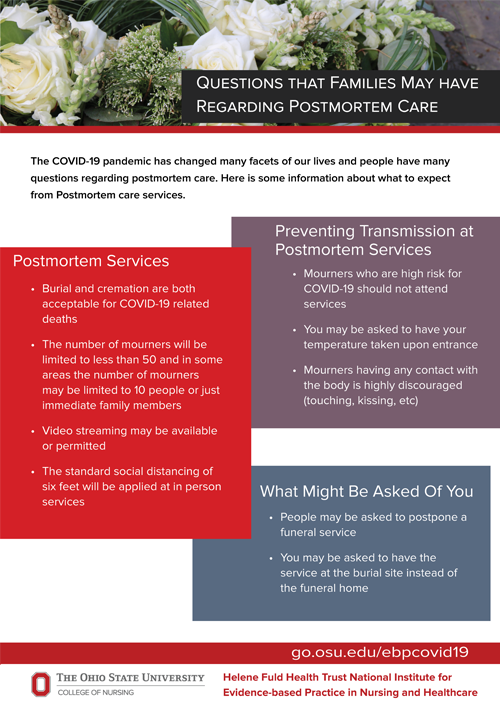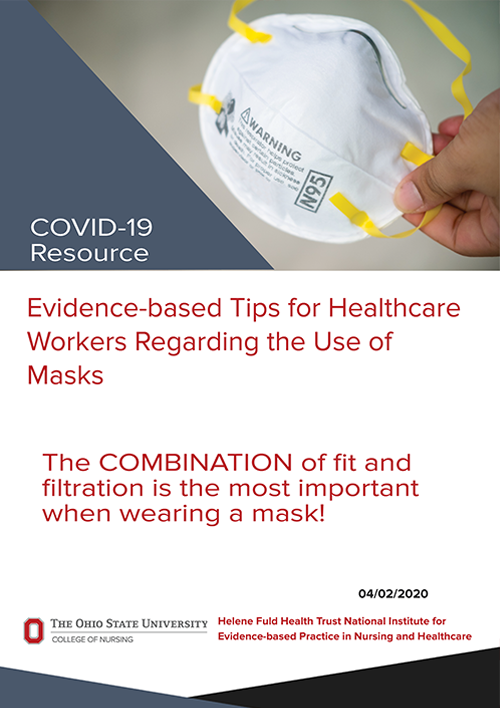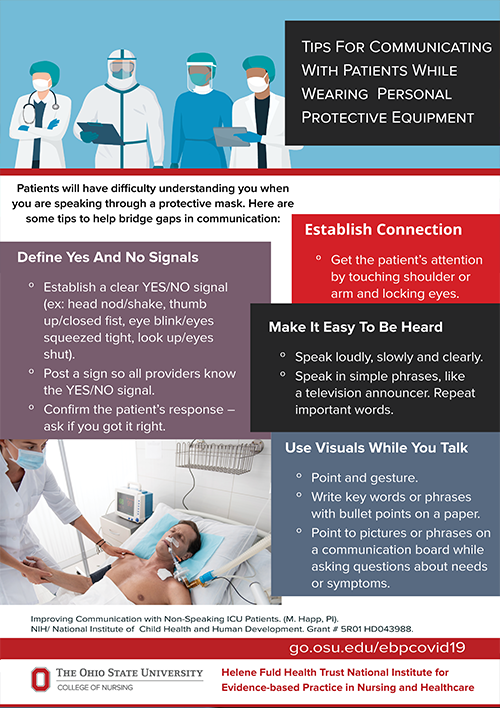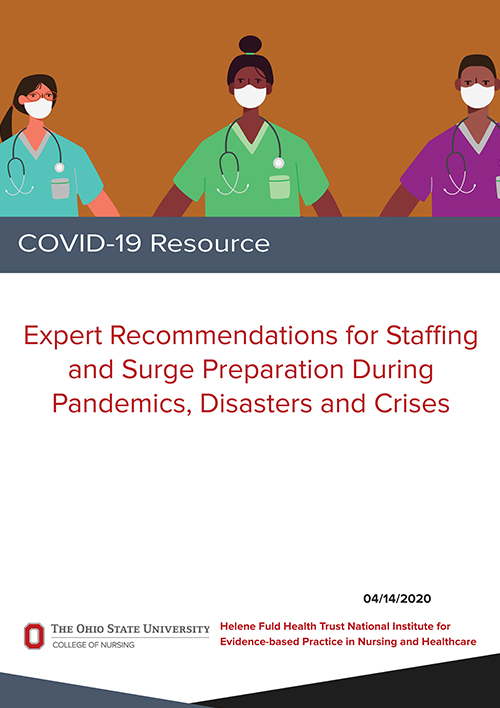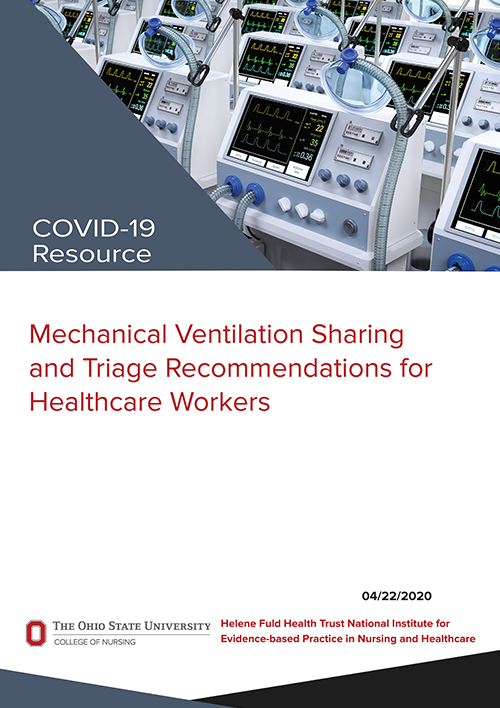
This page is an archive of evidence-based COVID-19 resources we compiled and produced in 2020 at the start of the global pandemic.
In an effort to help healthcare workers and the general public during the coronavirus (COVID-19)/severe acute respiratory syndrome coronavirus 2 (SARS-CoV-2) pandemic, the Helene Fuld Health Trust National Institute for Evidence-based Practice in Nursing and Healthcare has compiled evidence-based resources. Below is the repository we have created. We will continuously update the repository with accurate information and guidance based on the evidence.
Recommendations Based On Evidence from March 2020 Evidence Review
Personal Protective Equipment For Healthcare Workers (More Information)
Based on the current evidence, the Fuld Institute for EBP recommends and supports the provision of personal protective equipment (PPE) for healthcare workers (HCWs) at all points of care and that HCWs use appropriate PPE consistently and correctly, rather than homemade cloth masks. HCWs should consider homemade cloth masks only as a last resort.
(03/31/2020)
Resources for the General Public
Masks
- Understanding the Difference - Mask Type Comparison - One Page
- Making Effective Masks Video
- Making Effective Masks - One Page
- The Facts About Face Masks
Postmortem
Resources for Healthcare Workers
Masks
- Evidence Based Tips For Healthcare Workers Regarding The Use Of Masks
- Communicating While Wearing Personal Protective Equipment
Staffing
Ventilators
Webinar On Special COVID-19 Topics
- Fuld Free Webinar - Evidence Based Updates on COVID-19 Special Topics
- Fuld Free Webinar - COVID-19 Special Topics: Early Proning and Effective communication with mechanically ventilated patients
Other Resources
Understanding the Difference - Mask Type Comparison Flyer
There is an explosion of interest in making and using homemade cloth masks with little attention to best practice. We have reviewed the evidence regarding different types of masks and have developed an easy-to-interpret infographic modified from the Centers for Disease Control (CDC) information. Our infographic compares the three types of masks that are being considered and discussed: N95 respirators, surgical masks and homemade cloth masks.
Making The Most Effective Masks Video
This is a small section of one of our Fuld Institute for EBP free webinars focusing on special topics around COVID-19. This short video focuses on the most effective evidence-based advice on making homemade face masks.
Making The Most Effective Masks
We've distilled information from numerous studies about the effectiveness of facemasks in filtration and how to make the most effective homemade face masks.
Download High-res Shareable Graphic
Updated 04/03/2020
The Facts About Face Masks
Our Facts About Face Masks pamphlet contains a more in-depth look at the studies around the effectiveness of face masks while still keeping the information accessible and easy to understand. Get informed on face masks and how they protect you and your family.
Postmortem Care
The COVID-19 pandemic has changed many facets of our lives and people have many questions regarding postmortem care. Here is some information about what to expect from Postmortem care services.
Evidence-based Tips For Healthcare Workers Regarding The Use Of Masks
It is an unprecedented time in healthcare. The coronavirus pandemic has changed the context of healthcare and how we work. Many healthcare workers (HCWs) do not have access to personal protective equipment (PPE) and they are requesting evidence-based information about the use of homemade cloth masks during the coronavirus pandemic.
Based on the current evidence, the Fuld Institute for EBP recommends and supports the provision of personal protective equipment (PPE) for healthcare workers (HCWs) at all points of care and that HCWs use appropriate PPE consistently and correctly rather than homemade cloth masks. HCWs should consider homemade cloth masks only as a last resort. (03/31/2020)
Updated 04/03/2020
Communicating While Wearing Personal Protective Equipment
Patients will have difficulty understanding you when you are speaking through a protective mask. Here are some tips to help bridge gaps in communication.
Expert Recommendations for Staffing and Surge Preparation During Pandemics, Disasters and Crises
There is a body of evidence about staffing ratios and patient acuity. Researchers
have studied the impact of staffing models on patient, clinician and organizational
outcomes under typical (usual intensive care unit) conditions.
Mechanical Ventilation Sharing and Triage Recommendations
In a disaster or crisis situation, healthcare resources such as mechanical ventilators may become scarce. The evidence on mechanical ventilation sharing as a strategy to mitigate ventilator scarcity is reviewed and assessed in this document.
RECOMMENDATIONS
- The limited evidence does not support placing multiple patients on one ventilator. More research needs to be completed.
- Resource allocation tools and mortality risk assessment tools should be used to identify the most appropriate and effective use of scarce resources for triage.
Evidence Based Updates on COVID-19 Special Topics Webinar
This webinar will provide evidence-based updates on COVID-19 topics relevant to healthcare clinicians. Topics include the use of homemade masks, ventilator sharing and staffing models in COVID-19 acute care settings.
Evidence-based Updates on COVID-19 Special Topics Webinar Slides Handout
COVID-19 Special Topics: Early Proning and Effective communication with mechanically ventilated patients
This webinar will provide evidence-based updates on the COVID-19 topics of early proning and effective communication with mechanically ventilated patients.
Early proning and effective communication with mechanically ventilated patients
Evidence-based Updates on COVID-19 Special Topics: Team Nursing and Delegation
This webinar will provide evidence-based updates on COVID-19 topic: Team Nursing and Delegation. This webinar will provide a timely discussion delving into the evidence behind team nursing and its impact on outcomes. We will discuss how nurses may adapt elements of team nursing and delegation for staffing during the COVID-19 pandemic.
Evidence-based Updates on COVID-19 Special Topics: Team Nursing and Delegation
External Resources
There are many useful resources available to help cut through the inaccurate information currently being spread. We will link to resources that we feel have value in helping to provide evidence and fact-based information.
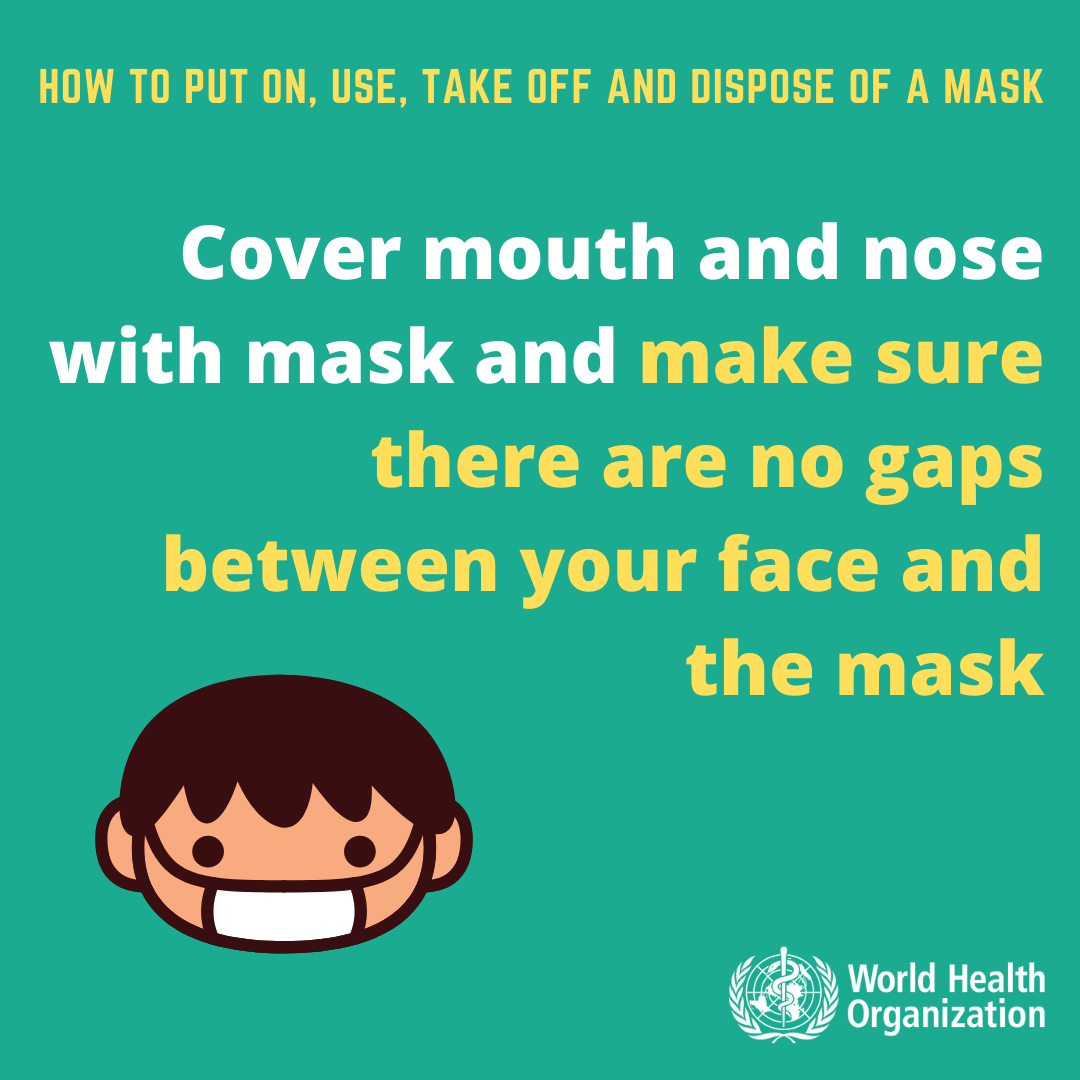 World Health Organization Public Advice Section
World Health Organization Public Advice Section
A great resource we have found for public information is the World Health Organization's advice for the public. It is full of quick advice and infographics that are well done and align with the evidence. Their advice section contains information on many topics such as coping with stress, healthcare in the home and how to deal with pregnancy related issues with COVID-19 present in your environment. Of particular note is their section of graphics and videos on mask usage.- World Health Organization Myth Busters Page
Contains simple, easy to understand and share answers and posters that separate fact from fiction relating to COVID-19. - NIH COVID19 Treatment Guidelines
A constantly updated “living document” with new information as new clinical data develops. It has an evidence-based methodology and many professional societies endorse it.
- Infectious Disease Society of America (IDSA) treatment guidelines
Uses a rigorous GRADE-accepted methodology for the generation of guideline and does not overlap or duplicate content from the NIH guidelines. - Should I Make My Own Mask? (New York Times)
A New York Times article on face masks for the public and conflicting information presented about them. Login may be required to read attached article. - AACN's Letter of Caution on Homemade Masks for Healthcare Workers
A statement from the American Association of Critical-Care Nurses on the effectiveness of home-made masks for healthcare workers. - American Academy of Nursing COVID-19 Resources
A collection of COVID-19 resources from the American Academy of Nursing. - CDC Guidance on Postmortem Specimens
CDC guidelines on how to collect and submit specimens collected from postmortem patients with known or suspected COVID-19.
EBP HQ Resources
Every resource that the Fuld Institute for EBP is creating to help provide evidence-based information relating to COVID-19 will be available within our open repository. If you are an EBP HQ Member you may have access to additional repositories of knowledge through our partnerships with leading healthcare research organizations. We will list extra resources that our EBP HQ members can access through our partnerships below.
- DynaMed Coronavirus Repository
Access to some resources linked in the DynaMed repository may only be available after logging into the EBP HQ - through the member login at the top of the page - and accessing the DynaMed resource link to authenticate.
